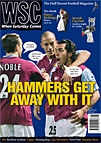 Argentine giants Boca Juniors have won yet another Copa Libertadores – with a little help from a Mr Riquelme of Villarreal, who was just passing through Buenos Aires. Robert Shaw reports
Argentine giants Boca Juniors have won yet another Copa Libertadores – with a little help from a Mr Riquelme of Villarreal, who was just passing through Buenos Aires. Robert Shaw reports
The Copa Libertadores final between Boca Juniors and Gremio failed to live up to expectations, with the Argentines winning 5‑0 on aggregate. Both legs were dominated by on-loan Juan Román Riquelme, whose two goals in the second leg overshadowed the more modest efforts of Liverpool-bound Lucas. As holidays go it was a pretty successful one for Riquelme, propelling the player back into the national squad after his post-World Cup retirement and helping his club to their sixth title. By the time Boca fanatic Diego Maradona stops bouncing up and down to celebrate this victory, Riquelme will be back at Villarreal via the Copa America after a successful $2.5 million loan.
While the 2007 Libertadores did not quite catch the imagination of previous years, Riquelme’s fortunes, including his eight-goal haul, underline one of the enduring strengths of a competition now in its 38th year. It acts as a window for South American talent – in some cases for players regarded as shop-soiled. While Riquelme used his Boca spell to recover his prestige at home and in Europe, another 2006 World Cup returnee, Ze Roberto, saw his stock soar again after helping Santos to a Libertadores semi-final with Gremio. Snubbing the Brazilian national team, Ze Roberto has opted for a lucrative return to Bayern Munich.
Four years ago two younger talents from Santos used the Libertadores as a platform for big moves, although Diego and Robinho couldn’t stop Boca in the final. Forty years before that, Pelé’s Santos had back-to-back Libertadores wins that consolidated the player’s fame and helped to push up the club’s price on the international exhibition circuit. Expanded TV coverage has added to this exposure and provided a wider audience for players from Peru, Paraguay and Colombia, whose national leagues do not receive the attention of Argentina’s and Brazil’s.
Boca’s win was their sixth and a fourth in the last eight years, but over the same period Paraguay’s Olimpia (2002) and Once Caldas of Colombia (2004) provided a healthy reminder of the open nature of this competition. Indeed Olimpia’s final against tiny Brazilian side São Caetano was reminiscent of Nottingham Forest playing Malmo in the 1979 European Cup final. This year, Colombian side Cucuta Deportivo were a whisker away from the final after beating Boca 3-1 at home in the first leg of the semi. While Argentine and Brazilian teams have claimed 12 of the 18 titles since 1990, there is still a glorious unpredictability about the Libertadores, compared to the Champions League. World Club champions Internacional could not even make it past the group stage this year; Flamengo were defeated by the long grass and pot shots of Uruguayan side Defensor in the last 16.
Gremio coach Mano Menezes accepted defeat by Boca gracefully, but pointed out that his team’s qualification for the final was two years ahead of schedule. “We were playing at our limit,” he noted in relation to the pressures on his squad. “Boca were technically superior.” Despite Riquelme’s virtuosity, this was not a vintage Boca effort – they relied on three set pieces and lax refereeing to conjure up the 3-0 home advantage. The return leg proved so comfortable, however, that they could indulge Martin Palermo’s slapstick efforts from the penalty spot. The man who missed three in a Copa America game against Colombia in 1999 blazed another kick wide in the second leg – but he had contributed a crucial late goal against Cucuta in the semi-final.
Even without Riquelme, Boca will be favourites to match fellow Argentines Independiente’s seven Libertadores titles next year. Club president Mauricio Macri received an immediate political premium when, a few days after the win in Porto Alegre, he was elected mayor of Buenos Aires with over 60 per cent of the vote. Few seem to find it odd that a right-wing businessman should be at the helm of a club that milks its dockland working-class roots, nor that a renowned friend of Fidel Castro, Diego Maradona, should have supported his conservative campaign. If his team win the Libertadores again in 2008, Macri may yet feel compelled to bid for the Argentine presidency.
From WSC 246 August 2007